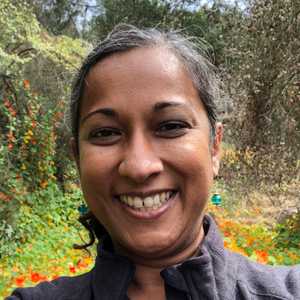Aradhna Tripati grew up in Los Angeles and when she was in college, took a general education course on Environmental Geology that ignited her passion for environmental science and geoscience. Aradhna pursued her undergraduate degree at California State University, Los Angeles, a primarily minority-serving undergraduate institution, and began her studies at the age of 12 through their Early Entrance Program. While in undergrad, Aradhna pursued research in paleoceanography with sedimentary geologist Pedro Ramirez, took classes and was mentored by igneous petrologist Bob Stull, mineralogist Gary Novak, and structural geologist Kim Bishop, was profoundly impacted by classes with a professor of gender and labor history, Carole Srole, and was part of a diverse and active undergraduate learning community in geology. She received her B.S. in Geological Sciences in 1996 and also received the Aaron Waters Award for Outstanding Senior.
Aradhna received her Ph.D. in Earth Sciences at UC Santa Cruz where she was a Gates Millennium Scholar, an Ocean Drilling Program Fellow, and a UC Regents’ Fellow – and she received the Aaron Waters Award for Best Thesis Proposal. While a graduate student at UC Santa Cruz, Aradhna studied the dynamics of greenhouse climates, using stable isotope and trace metal signatures in biologically-precipitated carbonates to reconstruct climate parameters and seawater chemistry and to identify post-depositional biases in the sedimentary record.
After receiving her Ph.D., Aradhna was awarded a postdoctoral fellowship to work with geochemists at the University of Cambridge studying past greenhouse climates and the greenhouse-icehouse climate transition using trace element and isotopic techniques they had developed. She was a research fellow at the University of Cambridge where she held the Thomas Nevile Fellowship in Natural Sciences, a Comer Abrupt Climate Change Fellowship, a National Environmental Research Council Fellowship, and a Marshall Sherfield Fellowship. Following her time at the University of Cambridge, Aradhna was a visiting scientist at the California Institute of Technology for several years, where she built on the innovative work by John Eiler his research group on carbonate clumped isotope theory, synthetic calcite, and mollusks.
She began as an assistant professor at UCLA in 2009 and received tenure in 2014. Currently, Aradhna is an associate professor with tenure at UCLA and is affiliated with the Department of Atmospheric and Oceanic Sciences, the Department of Earth, Planetary, and Space Sciences, the Institute of the Environment and Sustainability, the Institute of Geophysics and Planetary Physics, the American Indian Studies Center, and the California Nanosystems Institute.
Aradhna researches and teaches about climate change; the history and dynamics of changing Earth systems including climate, ice sheets, oceans, the water cycle, carbon dioxide levels; tool development; and clumped isotope geochemistry. Aradhna’s research program uses the rich laboratory provided by the geologic record provides to examine Earth’s climate evolution, with a focus on testing theoretical predictions, addressing ambiguities in past work, and validating model predictions of the past to evaluate their robustness for use in projections of the future. Her lab harnesses state-of-the-art chemical tracers with a focus on carbonate clumped isotope geochemistry. My work has also drawn on other isotopic systems and examined trace element distributions in carbonate minerals.
She has mentored, advised, co-advised, trained, or served on the committee for over 130 postdoctoral fellows and researchers, Ph.D. students, M.S. students, undergraduates, high school teachers, and high school students. Aradhna has over 3000 citations for her research, and has established world-renowned laboratories. She has 90 publications of which 13 are in Nature journals, Science, or Proceedings of the National Academy of Sciences, 181 conference abstracts, 13 invited talks and three keynote lectures at international conferences, and 50 invited talks at universities and research institutes.
Aradhna also is the faculty director and founder of the Center for Diverse Leadership in Science, the world’s first academic center for diversity in environmental science. Her lifelong goals include advancing new geochemical tracers for the study of Earth system processes, studying the history and dynamics of climate change, and working to educate, recruit, and retain a diverse population into environmental science and geoscience, and more generally in higher education.
Aradhna has received numerous awards for her research, education, and outreach programs including a Presidential Early Career Award in Science and Engineering from President Obama and the White House Office for Science, Technology, and Policy, and the National Science Foundation’s CAREER award, NSF’s most prestigious award in support of early career faculty who exemplify the role of teacher-scholars through outstanding research, excellent education and the integration of education and research within the context of the mission of their organizations. She received the Bromery Award for Minorities from the Geological Society of America. Aradhna has been named a Hellman Fellow and a National Academy of Sciences Kavli Fellow, and recently received the E.O. Wilson Award for Outstanding Science on climate change. She also was awarded a Chair International D’Excellence in Stable Isotopes by IUEM (Institut Universitaire European De La Mer).
